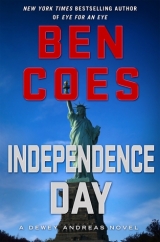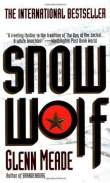
Текст книги "Independence Day "
Автор книги: Ben Coes
Жанры:
Боевики
,сообщить о нарушении
Текущая страница: 17 (всего у книги 28 страниц)
52
ELEKTROSTAL
Cloud looked out the window at the low-flung buildings of Elektrostal. Until now, the city meant nothing to him. It was a place to work. A place to remain anonymous, off the radar screens of law enforcement and intelligence agencies. Off the radar of men like Alexei Malnikov. But tonight, Cloud felt hatred for the small, shabby city.
Two forces had guided him to this place and to this moment. The nuclear bomb represented the past. It was the achievement of a life’s work, and the bomb’s detonation on American soil would be the culmination of it all. Then it would end, that life he desperately wanted to step away from, and his new life would start. That new life was Katya. Respectability. Belonging. Above all else, family. A child. Yes, a child. He hadn’t admitted that part to anyone, not even her, but it was what he wanted more than anything else. A little girl. Now it was gone. The dream was gone.
It was the first time he felt outdueled by anyone. In the span of a few hours, the plan he’d carefully constructed was cracking. Andreas had succeeded in taking away the future. All that was left was the past.
So be it, he thought.
“Has Langley discovered the trapdoors?” Cloud asked.
“No,” said Sascha. “They know something is going on. They’re running standard procedures to attempt to block us, but we should be fine.”
“Very well,” he whispered, too softly for no anyone else to hear.
A memory flashed. It was his father. He could hear him speaking. Sitting alone with him, in front of the hearth, playing chess.
“There are some moves in chess that are not understood, even by grand masters,” his papa said. “Moves that are made by some part of the brain that is the part that knows how to win.”
“But you did know,” he whispered. “You knew they would come after her. You exposed Katya. You exposed her the moment you sacrificed Al-Medi. It was inevitable.”
Cloud had hired the best three men money could purchase to guard Katya. Perhaps he could’ve somehow gotten her to cancel her performance, but he knew it ran the risk of alerting the Americans. The entire night had been based on subterfuge, on the Americans believing one reality while in fact another one lurked beneath.
Now, when he should have been on his way to Saint Petersburg to surprise his fiancée, he stood staring into the pitch-black oblivion of his own eyes reflected in the glass.
Had he misread his opponent? Had America been deceiving him all along?
“Impossible,” he remarked to himself.
Cloud knew the United States would never sacrifice men as part of a deception. They would not allow three soldiers to die at a dacha. This was not in their DNA. Russia, China, for that matter almost any country but the United States, would sacrifice men. But not America.
“Oh, no,” he said to himself as a tingling sensation arose from his spine.
He arrived at the conclusion he was after: he was playing chess against an opponent who played by a different set of rules. Tonight, he’d fallen victim to the lowest of rule violations in the game of chess, a move done by children: the United States had placed an extra piece on the board. And not just a pawn or a rook. The abduction had been the work of a knight—bold, reckless, and violent.
“Interesting,” said Sascha.
Sascha’s words brought him back.
“What is it?”
“Saint Petersburg Metro,” said Sascha. “All points bulletin.”
Cloud read the document:
** FLASH: URGENT **
Possible mult homicide at rail yard
Kolpinsky Rayon km 554.7
Two dead
** SUSPECT AT LARGE **
“Where is Kolpinsky Rayon?” asked Cloud.
Sascha brought up a map of Saint Petersburg. The town was several miles downstream from Saint Petersburg, then inland, in the direction of Moscow.
“Now is the time to release Andreas’s identity,” said Cloud.
53
TOSNO, RUSSIA
They drove for several miles away from the rail yard. Dewey remained in the backseat, keeping the gun pressed to the officer’s neck. When they came to a small town, Dewey ordered the Russian to pull into the parking lot of a decrepit-looking strip mall, empty at this late hour.
“Behind the building,” Dewey ordered.
The policeman pulled in back of the building and parked next to a large black Dumpster.
“Get out,” said Dewey.
The officer got out as Dewey climbed from the back of the car, keeping the gun aimed at him.
“Give me the belt,” said Dewey. “Hurry up.”
The Russian unhooked his weapons belt and tossed it to Dewey, who threw it in the cruiser.
“Empty your pockets.”
The policeman had a wad of cash as well as a cell phone. Dewey pocketed the cash, then put the phone on the front seat of the cruiser.
Dewey stepped toward him.
“You saved your own life tonight by not doing something stupid. Don’t start now. I’m going to knock you out. When you wake up, you’ll be inside that Dumpster. Your head will hurt, but you’ll live.”
“May I ask you something?”
“What?”
“Did you abduct her?”
Dewey ignored his question, then slammed the Russian’s head with the butt of the pistol, a trained, precisely targeted strike that caused him to crumble to the ground, unconscious.
Dewey flex-cuffed the policeman’s wrists and ankles. He ripped part of his shirt off and tied it around his head and through his mouth, gagging him. Dewey lifted him over his shoulder, fireman style. He stepped to the Dumpster and dropped him in. The body made a clanging noise as it tumbled to the bottom.
By now, they knew the two dead men at the rail yard were policemen. A search for the officer’s car would be under way.
Dewey climbed back in the police car and tore away from the mall, driving without headlights. A few miles down the road, he saw a minuscule black object in the sky, directly in front of him, flying low. A moment later, he heard the dull rhythm of chopper blades slashing the air. He jacked the wheel left and barreled into a parking lot next to an apartment building. The chopper grew louder as Dewey gunned the sedan hard, streaking across the crowded parking lot. He aimed for an empty space, then slammed his brakes, sliding the last few feet as he came to a hard stop.
Clutching the gun in his right hand, the door handle in his left, Dewey listened from the car as the helicopter roared overhead, then was gone.
He stepped from the police cruiser to a white station wagon. With the butt of the gun, he smashed the rear window, then unlocked the car. He tossed the weapons belt onto the front seat.
He popped the trunk on the police cruiser. Inside sat a canvas duffel bag. He ransacked the bag and found a set of civilian clothes. He pulled out a pair of pants and a plaid short-sleeved button-down, changed, and left the police uniform in the trunk. The clothing was slightly baggy, but it didn’t rub against the gash near his knee.
At the bottom of the duffel, he found another cell phone, which he guessed was the officer’s personal phone.
He hotwired the station wagon in less than half a minute. He gunned the car toward the main road.
Dewey needed time, the time to settle things down and get away from the immediate vicinity of Saint Petersburg and the rail yard. He was in a rapidly escalating mess. He needed to make contact with Langley. The problem was, he was being hunted by FSB, one of the most notoriously hard-hitting law enforcement agencies in the world.
It had to be.
Get away. That’s your top priority.
He turned on the phone and went to the map application. He was near a town called Lyuban. Moscow was east. He studied the route, then exited the map application and dialed Langley.
After several rings, a high-pitched monotone could be heard. Dewey punched in a code and a woman came on the line.
“Signal.”
“TS 2294 dash 6.”
“Hold, please.”
A few seconds later, Dewey heard a click, then a voice.
“Where are you?”
It was Calibrisi.
“Running. Do we know where he is?”
“Not yet.”
“What am I supposed to do?”
“You need to get to the safe house in Moscow. There’s food, weapons, and you can take a shower. There’s another operator waiting at the safe house as well as a case officer. Bill is sending in more men.”
“Who’s the operator?”
“His name is Maybank. He’s injured.”
Dewey glanced down at his pants. He could see red from the wound, which was continuing to bleed.
“How close are we on the intel?” asked Dewey.
“We’re working on it,” said Calibrisi. “NSA, Pentagon, Langley—everything is focused on this right now. But—”
“What?”
“It’s a needle in a haystack. This guy is an unknown. A ghost.”
“FSB is going to be tracking me,” said Dewey. “If I’m the only able-bodied operator over here, that’s a problem.”
“I’m working on other options,” said Calibrisi, quieter. “NonAgency resources.”
“Israel?”
“No,” said Calibrisi. “Someone outside official channels. I’ll tell you more when you get to the safe house.”
54
DIRECTOR’S OFFICE
CIA
Calibrisi hung up with Dewey, then dropped the cell phone to the floor and stepped on it, smashing it to pieces. He removed another disposable cell phone from his desk and dialed a number in London.
“Gansevoort PLC,” came the soft, clipped British accent of a woman. “How may I direct your call?”
“I’ve been in a car accident on Ratcliffe Highway,” said Calibrisi.
“Hold, please.”
A moment later, another woman came on the line.
“Director’s office. How may I help you?”
“Natalie, it’s Hector Calibrisi.”
“Hello, Hector. Let me get him for you.”
As Calibrisi waited, a tall man with glasses appeared outside the glass door to his office. It was Ted Wendell, the Agency’s chief technology officer. Wendell was spearheading the effort to determine how Cloud had hacked into Langley’s network infrastructure—and to sanitize it.
Calibrisi held up his hand, telling Wendell to wait.
“Hector,” came the aristocratic English accent of MI6’s Cambridge-educated director, Derek Chalmers. “How are you?”
“Not so good.”
“Did you have a little too much vodka, Hector?” asked Chalmers.
Calibrisi was momentarily quiet.
“What do you know?”
“Very little. But Dewey’s photo is on the wire, so I knew something was up. They haven’t identified him yet, but there is a manhunt. He’s going to get rolled up, Hector. Do you want us to assist in the reconnaissance?”
“I’m not worried about Dewey.”
“Did he abduct the woman?”
“Yes.”
“Tell me, why is the United States so interested in Russian ballerinas all of a sudden?”
“Her fiancé is a terrorist. He put a thirty-kiloton nuclear bomb in a boat and it’s on the way to the United States.”
A soft whistle came from Chalmers.
“What do you need from us?” he asked. “It goes without saying, we’re at your service.”
“Katya Basaeyev is being flown to Inverness,” said Calibrisi. “I need your best interrogator. At this point, she’s our only connection to him.”
“And he’s the only one who knows where it’s going?”
“Correct.”
“How far out is the vessel?”
“Two days.”
“July Fourth,” noted Chalmers. “Independence Day. You’re lucky we Brits don’t hold grudges.”
Calibrisi cleared his throat.
“Very lucky, Derek. Thank you, as always, for your help.”
“I’ll fly up right now,” said Chalmers.
“You don’t need to go. Just send up your top interrogator.”
“That happens to be me. If she knows something, I’ll find it out.”
“Dewey thinks she’s innocent. He said that she seemed genuinely surprised at the fact that her fiancé is a bad guy.”
“As you know, and despite his irascible countenance, I’m one of Dewey’s biggest fans,” said Chalmers. “But he’s an operator. I nearly lost my life due to a Russian honey trap. Never trust a Russian woman. What’s the fiancé’s name, by the way?”
“Pyotr Vargarin. He’s called Cloud.”
“Cloud?” said Chalmers. “What a pompous ass. Already I don’t like the fellow. Send some biographical information, will you?”
“Will do.”
Calibrisi hung up his phone, then nodded to Wendell, who pushed in the door and entered Calibrisi’s large glass-walled office.
“Where are we on this, Ted?” asked Calibrisi.
“It’s bad,” said Wendell. “It’s some sort of virus. It’s going to take awhile. Cloud has been inside for more than a year. He built a bunch of trapdoors. Looks like he can come and go as he pleases.”
“Can’t we remove them?”
“The problem is, we don’t know how many, or where they are. As long as the virus is still active, we could theoretically get rid of all the trapdoors but still not have gotten to the heart of the problem.”
“How long to clean it?”
Wendell shrugged his shoulders.
“A couple weeks, maybe a month.”
“Can we get some contractors on it? Cyber security specialists?”
“That’s like hiring the police to stop a bank robbery after it’s happened, Hector.”
“What’s your point?”
“He’s inside,” said Wendell. “He cracked the vault and now he’s inside. We don’t need a cop. We need a bank robber.”
Calibrisi nodded, deep in thought.
“Thanks, Ted,” he said, nodding to the door. “That’ll be all.”
Calibrisi waited until Wendell left, then put both hands on top of his desk, bracing himself against the wave of anxiety that flooded over him. It wasn’t just the lack of manpower on the ground in Russia. They were exposed here, in the United States, as well. Time was running out. The enemy was attacking on all fronts. Like cancer, he’d laid down his contagion silently, at a level that was invisible to the human eye. By the time Rublevka went south, the cancer had already taken hold. Now they were witnessing the rapid metastasis of the illness. It was spreading. Worst of all, there was no longer a vague premonition as to the day the cancer would take down its victim. Chalmers was right: the attack they nicknamed 9/12 would take place on Independence Day, the Fourth of July, a nation’s birthday that in two days’ time would be forever marked by genocide.
Calibrisi picked up an object from his desk. It was an old pistol, a Walther PPK, its black patina worn from use. It was a gun that, many years ago, in a Berlin apartment building, had been used by a Stasi agent to try to kill him. The slug had missed. Not by much, but it had missed, and Calibrisi had taken the gun after putting a bullet through his would-be killer’s head. He kept it because it reminded him of the thin line that separated victory from defeat, good luck from bad luck, life from death. An inch here, a moment there.
A sudden, violent lurch when your enemy doesn’t expect it.
Calibrisi understood then what he needed to do.
He crossed his office and opened the small closet at the opposite side of the room, quickly stuffing a few items in a beat-up leather weekend bag. He went back to his desk, opened a drawer, and pulled out a bundle of disposable cell phones and put them in the bag.
A few minutes later, bag in hand, Calibrisi stepped off the elevator eight floors below and walked down the hallway. He put his hand on a scanner next to the door. A half second later, the door unlocked and he stepped inside Targa.
Polk was standing before one of the plasma screens, watching a live POV video of one of the agents now attempting to infiltrate Russia. The view showed a line of passengers at an airport.
Calibrisi got Polk’s attention. Polk crossed the room.
“What’s the status on the team?”
“It’s set up,” said Polk. “Brainard and Fairweather should be wheels-up within the hour.”
For the first time, Polk saw Calibrisi’s leather bag.
“Where you going?”
Calibrisi paused, then spoke: “I’m going off grid. I’ll call you.”
55
ABOARD THE LONELY FISHERMAN
INTERNATIONAL WATERS
When Poldark awoke the next morning, he leaned immediately to his left and started vomiting.
You’re running out of time.
The radiation sickness was already upon him. It would settle in quickly, ravage for a day or two, then kill them all. By the time they arrived at their destination, all of the men aboard the boat would wish they were dead. Poldark, mainly due to his age, would likely be dead.
Poldark, Faqir, and the other six men aboard the trawler had all agreed to what was to come. They all signed up to die on behalf of a cause.
For Faqir and the Chechens, that cause was jihad. For Poldark, the reason had nothing to do with jihad. It had to do with a man named Vargarin, though not Pyotr.
Anuslav Vargarin had been Poldark’s professor and mentor. He studied under Vargarin and it was Vargarin who convinced Poldark, at age twenty-one, to pursue a life devoted to scientific discovery and academic research. Professor Vargarin had been his undergraduate advisor, his doctoral thesis advisor, and, for twenty-two years, his colleague.
Poldark was part of the team that helped Anuslav Vargarin turn an idea into a theory and then, ultimately, into a formula, a formula that eventually got Vargarin killed. In a few days, it would kill Poldark as well, though in a very different way. It would kill Poldark because he would utilize the formula to divide the nuclear device into two nuclear devices, and, during that process, would be exposed to lethal amounts of gamma radiation. He would die either when the bomb was detonated in New York City or from radiation sickness before they got there.
What Vargarin created, with Poldark’s assistance, was a way to achieve supercritical mass with less uranium than a standard nuclear device. Though other scientists had also succeeded in achieving the same goal, all had done so with chemical accelerants that, while not as difficult to procure as uranium, still required the use of apparatus and/or chemicals that only a major enterprise possessed, such as a cyclotron or polonium. Vargarin’s theory achieved supercritical mass with a slight twist, using a chemical compound that could be made more easily than had ever been achieved before, without a cyclotron and without the need for a rare element such as polonium.
In essence, it meant two bombs could be created from one. At a time when the Soviet Union and the United States were at war, a Cold War, racing to amass nuclear weapons, Vargarin’s idea was revolutionary. A country could double its existing stockpile of nukes without the need for more radioactive material. It was an idea big enough for America to kill for.
When the Americans killed Anuslav Vargarin and stole the formula, they also killed Poldark’s hope of a scientific career as celebrated as Vargarin’s. He would have been part of the team that designed it. In the Soviet Union, such accomplishments were handsomely rewarded, its scientists treated like rock stars. America had robbed him of his future.
Nearly thirty years later, Vargarin’s Theorem was no longer innovative or, for that matter, used.
But all that was secondary to Poldark. All that mattered to him was that it worked.
* * *
After carefully removing the bomb’s component parts, Poldark took two of the eight uranium rings and placed them in a steel case beneath the table. He reassembled the original physics package. He drilled a small hole through its cap and then welded the cap back on.
Next he went to the duffel and removed a shiny steel cylinder that was longer and wider than the original. Over the next several hours, he replicated the design of the original bomb. Once the gun assembly was done, he welded a similar end cap to it, though this one had a slight modification. At the center was a small threaded hole.
Poldark went to the duffel and removed what was the most important part of the process. It was a large thermos, filled with a liquid, radiogenic isotope of bismuth. It looked like water. Using a plastic funnel, he poured the contents of the thermos into the second device.
From the black tool case, he removed two specially designed copper bolts. At the head of each bolt, three small screws stuck out like small antennae. He screwed a bolt into each of the caps, threading them tightly into the holes at the end of each bomb.
Poldark removed two small, similar-looking devices from the duffel bag. They resembled cell phones except that both had wires dangling out. These were the triggers. He attached the wires from each trigger to the copper bolts atop the two bombs, wrapping them around the screws, then fastening them tight. He wrapped several strips of duct tape over the end of each bomb.
Finally, he removed two detonators from the tool case. These were thin, square boxes the size of television remotes, made of white plastic. On one side of each detonator was a square blue cap that stuck out. Poldark placed each detonator on the table, then lifted up the caps. Beneath were switches, like light switches. They glowed dull red. He closed the covers and wrapped duct tape around them, ensuring no one accidentally flipped either of them before they were in place and ready to be detonated. He marked each detonator with a number so that the right detonator went with the bomb it had been programmed to.
Poldark stepped back from the table. He placed his hands behind his back, leaned against the wall, and slowly slid down and sat on the floor. He pulled the SCBA, self contained breathing apparatus, from over his head. Beneath, he was wet with perspiration, his skin a pale, ashen gray. Poldark crossed his legs. He sat and stared at the two bombs for more than ten minutes.
He looked up at a clock on the wall. He’d been working for twelve hours. His eyes returned to the bombs.
Would Anuslav be proud of him now? he wondered. Would he be proud of him for implementing his vision? For helping his son exact vengeance on those who’d killed his mother and father as he watched, an innocent five-year-old, sentenced to life as an orphan, crippled by a memory that could not be erased? Would Anuslav share the sense of justice when the bombs tore through life and limb of countrymen who’d taken his very life? Who’d stolen his life’s work, sacrificing one of the Soviet Union’s greatest scientific minds, all for a few sheets of paper filled with letters and numbers? Would the great professor be proud of him now?
Poldark knew the answer.








